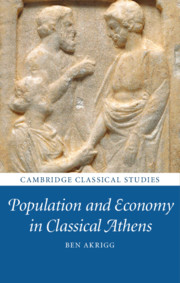Refine search
Actions for selected content:
60601 results in Classical studies (general)
TEACHING CLASSICS - (A.) Holmes-Henderson, (S.) Hunt, (M.) Musié (edd.) Forward with Classics. Classical Languages in Schools and Communities. Pp. xviii + 276, fig., ills. London and New York: Bloomsbury Academic, 2018. Paper, £29.99, US$40.95 (Cased, £95, US$128). ISBN: 978-1-4742-9767-7 (978-1-4742-9595-6 hbk).
-
- Journal:
- The Classical Review / Volume 69 / Issue 2 / October 2019
- Published online by Cambridge University Press:
- 22 March 2019, pp. 668-669
- Print publication:
- October 2019
-
- Article
- Export citation
AN INTERPRETATION OF A SATYR PLAY - (C.A.) Shaw Euripides: Cyclops. A Satyr Play. Pp. xiv + 158, ills. London and New York: Bloomsbury Academic, 2018. Cased, £85. ISBN: 978-1-4742-4579-1.
-
- Journal:
- The Classical Review / Volume 69 / Issue 2 / October 2019
- Published online by Cambridge University Press:
- 21 March 2019, pp. 383-385
- Print publication:
- October 2019
-
- Article
- Export citation
AN INTRODUCTION TO LUCIAN - (M.) Baumbach, (P.) Von Möllendorff Ein literarischer Prometheus. Lukian aus Samosata und die Zweite Sophistik. Pp. 269. Heidelberg: Universitätsverlag Winter, 2017. Paper, €26. ISBN: 978-3-8253-6460-1.
-
- Journal:
- The Classical Review / Volume 69 / Issue 2 / October 2019
- Published online by Cambridge University Press:
- 21 March 2019, pp. 428-430
- Print publication:
- October 2019
-
- Article
- Export citation
POWER, STATUS AND THE ROMAN PROVINCES - (R.) Varga, (V.) Rusu-Bolindeţ (edd.) Official Power and Local Elites in the Roman Provinces. Pp. xx + 193, figs, ills, maps. London and New York: Routledge, 2017. Cased, £95, US$145. ISBN: 978-1-4724-5731-8.
-
- Journal:
- The Classical Review / Volume 69 / Issue 2 / October 2019
- Published online by Cambridge University Press:
- 21 March 2019, pp. 542-544
- Print publication:
- October 2019
-
- Article
- Export citation
CICERO BELTS ARATUS: THE BILINGUAL ACROSTIC AT ARATEA 317–20
-
- Journal:
- The Classical Quarterly / Volume 69 / Issue 1 / May 2019
- Published online by Cambridge University Press:
- 21 March 2019, pp. 222-228
- Print publication:
- May 2019
-
- Article
- Export citation
DISABILITY IN ROMAN ANTIQUITY - (C.) Laes Disabilities and the Disabled in the Roman World. A Social and Cultural History. Pp. xii + 238. Cambridge: Cambridge University Press, 2018. Cased, £75, US$99.99. ISBN: 978-1-107-16290-7.
-
- Journal:
- The Classical Review / Volume 69 / Issue 2 / October 2019
- Published online by Cambridge University Press:
- 21 March 2019, pp. 547-549
- Print publication:
- October 2019
-
- Article
- Export citation
MUTILATING DEMIPHO IN PLAUTUS’ MERCATOR
-
- Journal:
- The Classical Quarterly / Volume 69 / Issue 1 / May 2019
- Published online by Cambridge University Press:
- 11 March 2019, pp. 453-455
- Print publication:
- May 2019
-
- Article
- Export citation

Population and Economy in Classical Athens
-
- Published online:
- 08 March 2019
- Print publication:
- 28 March 2019
Bibliography
-
- Book:
- Antiochus and Peripatetic Ethics
- Published online:
- 15 February 2019
- Print publication:
- 07 March 2019, pp 209-221
-
- Chapter
- Export citation
Abbreviations
-
- Book:
- Antiochus and Peripatetic Ethics
- Published online:
- 15 February 2019
- Print publication:
- 07 March 2019, pp x-xii
-
- Chapter
- Export citation
1 - Antiochus in Rome
- from Part I - Antiochus in Rome and Old Academic History of Philosophy
-
- Book:
- Antiochus and Peripatetic Ethics
- Published online:
- 15 February 2019
- Print publication:
- 07 March 2019, pp 19-35
-
- Chapter
- Export citation
Epilogue
- from Part II - The Ethics of the Old Academy
-
- Book:
- Antiochus and Peripatetic Ethics
- Published online:
- 15 February 2019
- Print publication:
- 07 March 2019, pp 202-208
-
- Chapter
- Export citation
6 - Oikeiōsis towards Theoretical Virtue
- from Part II - The Ethics of the Old Academy
-
- Book:
- Antiochus and Peripatetic Ethics
- Published online:
- 15 February 2019
- Print publication:
- 07 March 2019, pp 142-154
-
- Chapter
- Export citation
7 - Social Oikeiōsis
- from Part II - The Ethics of the Old Academy
-
- Book:
- Antiochus and Peripatetic Ethics
- Published online:
- 15 February 2019
- Print publication:
- 07 March 2019, pp 155-166
-
- Chapter
- Export citation
4 - Self-Love in the Antiochean-Peripatetic Account
- from Part II - The Ethics of the Old Academy
-
- Book:
- Antiochus and Peripatetic Ethics
- Published online:
- 15 February 2019
- Print publication:
- 07 March 2019, pp 105-122
-
- Chapter
- Export citation
Index Locorum
-
- Book:
- Antiochus and Peripatetic Ethics
- Published online:
- 15 February 2019
- Print publication:
- 07 March 2019, pp 222-228
-
- Chapter
- Export citation
GENERAL Index
-
- Book:
- Antiochus and Peripatetic Ethics
- Published online:
- 15 February 2019
- Print publication:
- 07 March 2019, pp 229-234
-
- Chapter
- Export citation
Acknowledgements
-
- Book:
- Antiochus and Peripatetic Ethics
- Published online:
- 15 February 2019
- Print publication:
- 07 March 2019, pp vii-ix
-
- Chapter
- Export citation
8 - The Antiochean Conception of theHappy Life
- from Part II - The Ethics of the Old Academy
-
- Book:
- Antiochus and Peripatetic Ethics
- Published online:
- 15 February 2019
- Print publication:
- 07 March 2019, pp 167-182
-
- Chapter
- Export citation
Introduction
-
- Book:
- Antiochus and Peripatetic Ethics
- Published online:
- 15 February 2019
- Print publication:
- 07 March 2019, pp 1-16
-
- Chapter
- Export citation
